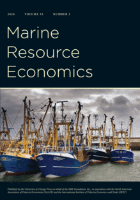
Marine Resource Economics
Scope & Guideline
Empowering Policy through Marine Economic Insights
Introduction
Aims and Scopes
- Economic Analysis of Marine Resources:
The journal emphasizes the application of economic principles to understand the dynamics of marine resource use, including fisheries, aquaculture, and coastal management. - Interdisciplinary Approaches:
Research often integrates methodologies from economics, environmental science, and social sciences to provide comprehensive insights into marine resource issues. - Policy Evaluation and Development:
A significant focus on evaluating and developing policies that promote sustainable use of marine resources, balancing economic viability with ecological health. - Impact of Climate Change and Environmental Factors:
The journal explores how climate change and other environmental factors affect marine resources, including their economic implications. - Community and Socioeconomic Studies:
Research includes the socioeconomic aspects of marine resource management, emphasizing the role of local communities and stakeholders in decision-making.
Trending and Emerging
- Sustainability and Resilience:
There is an increasing focus on sustainability and resilience in fisheries and aquaculture, assessing how practices can adapt to environmental changes and ensure long-term viability. - Technological Innovations:
The journal is seeing a rise in studies examining the impact of technological advancements, such as machine learning and data analytics, on fishing practices and market dynamics. - Economic Valuation of Ecosystem Services:
Emerging research emphasizes the economic valuation of ecosystem services provided by marine environments, highlighting their importance in policy-making and conservation efforts. - Health and Nutrition Economics:
There is a growing interest in the health and nutrition aspects of aquatic foods, exploring their role in diets and public health, particularly in the context of global food security. - Climate Change Adaptation Strategies:
Recent papers increasingly address adaptation strategies to climate change impacts on marine resources, focusing on economic implications and community adaptation.
Declining or Waning
- Traditional Fisheries Management:
There has been a noticeable decrease in papers solely focusing on traditional fisheries management practices, as newer methodologies and interdisciplinary approaches gain prominence. - Static Economic Models:
The use of static models in economic analysis of marine resources appears to be waning, with a shift towards dynamic and more complex modeling techniques that account for uncertainty and variability. - Local Case Studies:
Research centered on specific local case studies is becoming less frequent, as there is a growing trend towards broader, comparative analyses that incorporate multiple regions or global perspectives.
Similar Journals
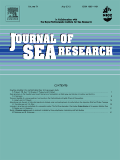
JOURNAL OF SEA RESEARCH
Pioneering Discoveries in Aquatic Science and EcologyJOURNAL OF SEA RESEARCH, published by Elsevier, is a premier academic journal dedicated to advancing knowledge in the fields of aquatic science, ecology, and oceanography. Since its inception in 1996, this journal has provided a vital platform for researchers and professionals to disseminate groundbreaking findings and promote fostering interdisciplinary discussions. With its impressive Q2 ranking in multiple categories, including Aquatic Science and Ecology, Evolution, Behavior and Systematics, it positions itself as a significant contributor to marine and environmental studies. The journal is accessible in both print (ISSN: 1385-1101) and online formats (E-ISSN: 1873-1414), ensuring wide reach and engagement within the scholarly community. Researchers and students alike will find the journal not only a reliable source of information but also a source of inspiration for future explorations. With a commitment to quality and a broad scope that spans fundamental to applied research, JOURNAL OF SEA RESEARCH remains an indispensable resource for understanding the complexities of marine environments and their relevance to our changing world.

Marine Policy
Elevating Marine Affairs Through Rigorous ScholarshipMarine Policy is a premier academic journal published by Elsevier that focuses on the social, economic, and legal aspects of marine affairs. Established in 1977, the journal has consistently evolved to address pressing issues in marine governance, policy innovation, and environmental sustainability, making it an essential resource for researchers and professionals in the fields of aquatic sciences, law, and environmental management. With an impressive impact factor and rankings placing it in the Q1 quartile across multiple relevant categories—including Aquatic Science, Economics, and Environmental Science—Marine Policy is recognized for its influence and rigor within the scientific community. The journal adheres to high standards of peer review, ensuring that only the most significant contributions to marine policy and management reach its readership. Notably, it offers a range of access options to accommodate the diverse needs of its audience, promoting wider dissemination of knowledge crucial for the stewardship of marine resources. The ongoing dialogue facilitated by this journal supports policymakers, scholars, and students in fostering sustainable practices and informed decision-making in marine environments.

FISHERIES SCIENCE
Advancing aquatic science for sustainable fisheries.Fisheries Science, published by Springer Japan KK, is a renowned journal in the field of aquatic science, effectively bridging the gap between scientific research and practical application in fisheries management. With an ISSN of 0919-9268 and an E-ISSN of 1444-2906, this journal serves as a vital resource for researchers, professionals, and students interested in advancing their knowledge and understanding of aquatic ecosystems and fishery practices. Operating within a competitive landscape, Fisheries Science has achieved a respectable ranking in Scopus, placing 96th out of 247 journals in the Agricultural and Biological Sciences > Aquatic Science category, showcasing its integral role in contributing to this dynamic field. The journal encompasses a wide range of topics from sustainable development to conservation strategies, aiming to foster collaborative research and innovative solutions to the challenges facing fisheries today. While not an open-access journal, Fisheries Science remains a key publication for those dedicated to marine science and the sustainable management of aquatic resources, with a historical footprint extending from 1994 to 2024.
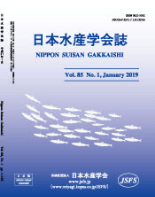
NIPPON SUISAN GAKKAISHI
Exploring the Depths of Fisheries ScienceNIPPON SUISAN GAKKAISHI, published by the Japanese Society of Fisheries Science, is a prestigious journal with a long history dating back to its inaugural issue in 1932. This journal, which spans key contributions to the field of Aquatic Science, serves as a vital platform for the dissemination of important research findings related to fisheries and aquatic biology, fostering knowledge and innovation in Japan and beyond. Although it is not an open-access publication, its rigorous peer-review process ensures the quality and integrity of the articles published. The journal is currently listed in the Q4 category for Aquatic Science according to the 2023 metrics, placing it within a niche but significant corner of the research landscape. With an ISSN of 0021-5392 and E-ISSN of 1349-998X, it continues to provide essential insights that benefit researchers, professionals, and students alike, highlighting advancements and challenges within aquatic ecosystems over a converged year span that continues to evolve through to 2024.

Research in Marine Sciences
Unveiling the secrets of the seas through rigorous research.Research in Marine Sciences, ISSN 2538-5542, is a leading journal published by ARMAN DARYA INC, specializing in the dynamic and interdisciplinary field of marine science. With a commitment to advancing knowledge in areas such as marine ecology, oceanography, and marine conservation, this journal provides a collaborative platform for researchers, professionals, and students to disseminate their findings. Although it operates under a traditional subscription model, the journal ensures that the latest research is accessible to a wide audience, promoting the understanding of marine environments crucial for biodiversity and sustainability. The journal aims to bridge the gap between theoretical research and practical applications, emphasizing the need for rigorous studies that address pressing marine issues in a rapidly changing world. By contributing to the body of literature in marine sciences, Research in Marine Sciences plays a vital role in shaping the future of marine research and policy-making.

Indian Journal of Geo-Marine Sciences
Bridging Disciplines in Geo-Marine ResearchThe Indian Journal of Geo-Marine Sciences, published by the NATIONAL INSTITUTE OF SCIENCE COMMUNICATION & INFORMATICS (NISCAIR), serves as a vital platform dedicated to the dissemination and advancement of knowledge in the field of marine and geosciences. As an open-access journal, it allows for improved visibility and accessibility of research findings to a global audience, enabling researchers, professionals, and students to share insights into oceanography and related disciplines. With a publication history spanning from 2007 to 2010 and continuing from 2012 to 2024, it has established itself within the academic community as a reliable source of innovative research, despite being classified in Q4 of Oceanography and holding a Scopus rank that places it in the 27th percentile. This journal is particularly relevant for those investigating marine ecosystems, geological oceanography, and their interconnections, thus playing an essential role in fostering understanding and communication within this important area of scientific inquiry.
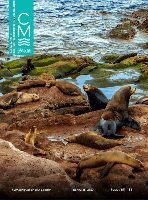
CIENCIAS MARINAS
Navigating the Future of Oceanic StudiesCIENCIAS MARINAS, an influential journal in the field of Aquatic Sciences, is published by the Instituto de Investigaciones Oceanológicas of the Universidad Autónoma de Baja California. Established as an open access platform since 2006, it aims to disseminate original research and critical reviews that contribute to the advancement of marine science. With a commitment to fostering scholarly dialogue, CIENCIAS MARINAS serves as a vital resource for academics, researchers, and practitioners interested in the ecological dynamics and biological processes of aquatic environments. Although currently ranked in the fourth quartile in Aquatic Science by Scopus, the journal remains dedicated to increasing its visibility and impact within the research community. Housed in Mexico, it offers a regional perspective that underscores the importance of coastal and oceanic research, making it an essential avenue for exploring marine biodiversity and conservation efforts. By engaging with this journal, readers can stay abreast of the latest developments and contribute to the growing body of knowledge in marine sciences.
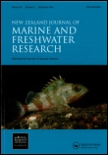
NEW ZEALAND JOURNAL OF MARINE AND FRESHWATER RESEARCH
Innovating Research for Sustainable Water ManagementNEW ZEALAND JOURNAL OF MARINE AND FRESHWATER RESEARCH, published by Taylor & Francis Ltd, stands as a distinguished platform for the dissemination of innovative research in the realms of aquatic science and ecology. With an ISSN of 0028-8330 and E-ISSN 1175-8805, this journal has been curating significant scientific contributions since its inception in 1967, continuing through to 2024. Recognized in the Q2 category across multiple relevant fields—including Aquatic Science, Ecology, and Water Science—this journal ranks notably in Scopus, with a 74th percentile for Ecology, Evolution, Behavior and Systematics, highlighting its impact and relevance within the scientific community. Though not an open-access publication, its rigorous peer-reviewed articles offer insights that resonate with researchers, professionals, and students who are passionate about advancing our understanding of freshwater and marine ecosystems. By fostering a collaborative space for ecological and environmental inquiries, the NEW ZEALAND JOURNAL OF MARINE AND FRESHWATER RESEARCH is essential for those aiming to contribute to the vital conversations around biodiversity, conservation, and sustainable management of aquatic resources.
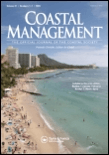
COASTAL MANAGEMENT
Bridging theory and practice in coastal management.COASTAL MANAGEMENT is a distinguished journal published by Taylor & Francis Inc, specializing in the interdisciplinary field of environmental science with a focus on coastal ecosystems. Since its inception in 1987, this journal has provided a critical platform for researchers and practitioners to disseminate innovative studies and practical solutions related to coastal management challenges. With an impressive Q2 ranking in both Environmental Chemistry and Environmental Science categories, it is recognized for its significant contributions to the field, evidenced by its Scopus ranking of #61/233 in General Environmental Science and #60/147 in Environmental Chemistry. Although open access options are not available, the journal maintains a broad readership within the academic community through its comprehensive exploration of coastal issues. With a commitment to advancing knowledge and fostering collaboration among experts, COASTAL MANAGEMENT plays a pivotal role in shaping sustainable practices and policies essential for the conservation and stewardship of our vital coastal environments.

Ocean and Coastal Research
Advancing marine science for a sustainable future.Ocean and Coastal Research, published by the Institute Oceanográfico of the University of São Paulo, is an essential academic journal dedicated to advancing the fields of Aquatic Science, Oceanography, and Water Science and Technology. Established in 2020, the journal has quickly become a noteworthy platform contributing to the understanding and sustainable management of marine and coastal ecosystems, with an open access model that promotes the dissemination of critical research findings. Although currently categorized in the fourth quartile across its respective fields in 2023, the journal serves as an emerging repository of valuable insights for researchers, professionals, and students alike, aiming to make impactful discoveries that address contemporary challenges in ocean conservation and resource management. The journal's editorial team is committed to fostering interdisciplinary collaboration and upholding rigorous peer-review standards, thereby ensuring high-quality contributions that reflect the dynamic nature of marine science. With an E-ISSN of 2675-2824, all access to published articles is freely available, supporting global research efforts addressing crucial environmental issues.